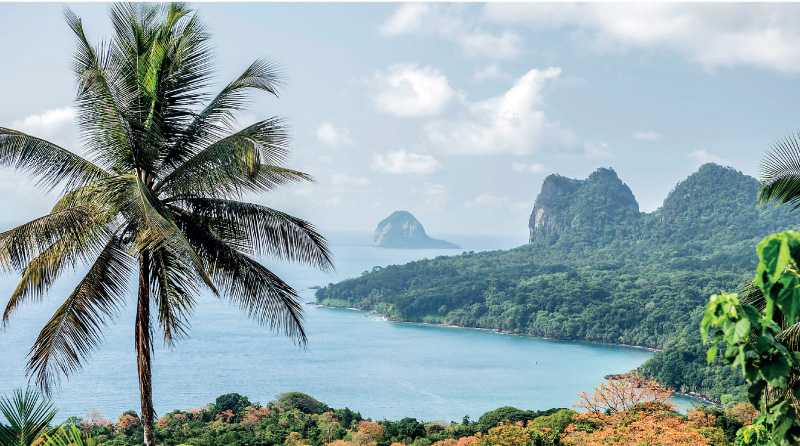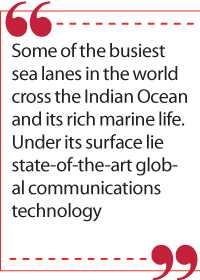Wednesday Feb 25, 2026
Wednesday Feb 25, 2026
Wednesday, 31 March 2021 00:34 - - {{hitsCtrl.values.hits}}

The Indian Ocean offers tremendous opportunities and some challenges for the island, coastal, and inland nations of South Asia and beyond
 It is the oceans that engendered life. The lives of humans remain connected to the seas, making the good health of the seas and the efficient management of sea-based activity essential elements for the wellbeing of people and nations.
It is the oceans that engendered life. The lives of humans remain connected to the seas, making the good health of the seas and the efficient management of sea-based activity essential elements for the wellbeing of people and nations.
The Indian Ocean offers tremendous opportunities and some challenges for the island, coastal, and inland nations of South Asia and beyond.
Regional cooperation is an excellent platform for leveraging opportunities and transforming challenges to promote the health of, and harmony in, this ocean space of common heritage, for common good.
Take the problem of plastic waste. Up to 15 million tons of plastic makes its way into the Indian Ocean each year, contaminating it with a trillion pieces of plastic and making it the world’s second most polluted ocean after the North Pacific.
South Asian countries have developed isolated projects to manage the ocean’s plastic waste. Fishermen in India’s southern state of Kerala were paid to recycle the plastic bags, straws, flip-flops, and other plastic detritus caught in their nets. Once shredded, the plastic was sold to construction companies that used it to strengthen asphalt roads. With regional cooperation, lessons learned by the Kerala fishermen could benefit other countries.
The formal basis for such cooperation is being laid. All eight nations of South Asia are now coming together through a new regional project, supported by the World Bank and its partners to fund innovative ways to prevent, collect, and upcycle plastic waste into global supply chains. The project also supports research and innovation grants to find and support alternatives to plastic.
The Plastic-free Rivers and Seas for South Asia project aims to help build a circular economy for plastic that will stop plastic waste from leaking into the environment. The Indian Ocean Rim Association, whose two dozen member states stretch from Australia to South Africa and north to Iran and the United Arab Emirates, are watching the
project and may expand it across the Indian Ocean.
Some of the busiest sea lanes in the world cross the Indian Ocean and its rich marine life. Under its surface lie state-of-the-art global communications technology. 
As the world’s economic growth engine pivots toward the Indo-Pacific, activity in the Indian Ocean increases. This growth must be managed in harmony with nature and in tranquillity, to ensure optimum and shared benefits, and prosperity for all.
For this purpose, it is essential for South Asian nations to work toward evolving a system where all communities that use the Indian Ocean pursue their aspirations and competing claims in accordance with international law, regional conventions, and age-old traditions.
A system with greater cooperation among states, and with differential treatment for resource and technical capacity asymmetries is needed for tackling natural disasters, promoting maritime security, and keeping sea lanes open and safe. This system should also enhance economic connectivity within South Asia and facilitate access to markets in the region and beyond, delivering goods and services at faster speeds, greater volumes, and lower costs.
Without doubt, the Indian Ocean needs better overall management which, among other measures, requires:
Working in partnership with countries and sharing information, expertise, and best practices is essential as no single country can meet these maritime challenges on its own. Disputes must be settled within a rules-based system that follows international norms and transparent practices.
South Asian nations can work together, with other major maritime nations beyond the region, and with multilateral institutions to promote health and harmony in the Indian Ocean. The results will benefit South Asia now and the generations to come.
(Ambassador Prasad Kariyawasam is a former Foreign Secretary of the Government of Sri Lanka, and has held several key diplomatic assignments including Sri Lanka’s Ambassador to the US and High Commissioner to India, Bhutan, and Afghanistan. He also served as his country’s Permanent Representative to the UN in Geneva and New York and was a member of UN panels on migrant workers and disarmament. Ambassador Kariyawasam is a champion of advancing regional integration and cooperation in South Asia.)